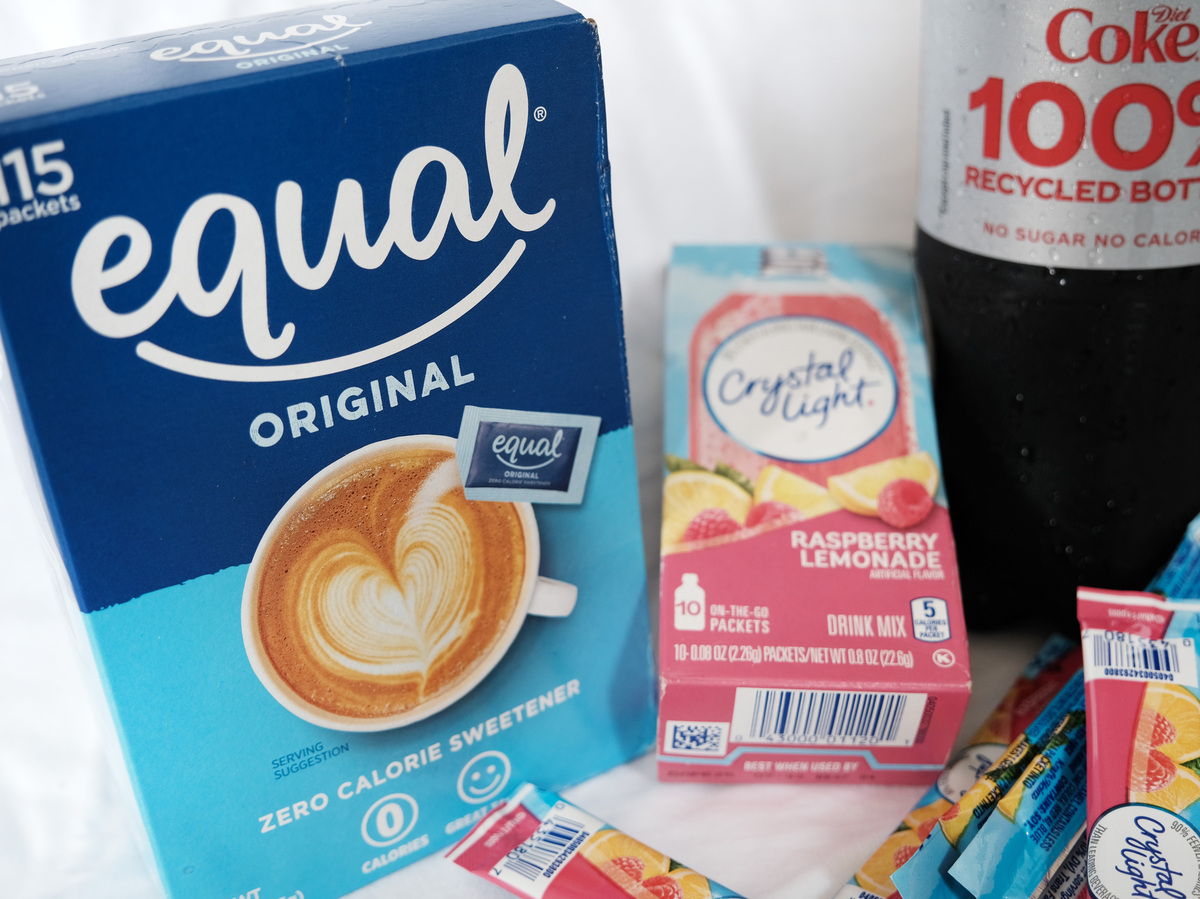
[ad_1]

Food merchandise containing the factitious sweetener aspartame are displayed on Friday in New York City.
Spencer Platt/Getty Images
cover caption
toggle caption
Spencer Platt/Getty Images

Food merchandise containing the factitious sweetener aspartame are displayed on Friday in New York City.
Spencer Platt/Getty Images
The announcement this week by a World Health Organization company that the factitious sweetener aspartame — utilized in such low-calorie merchandise as Diet Coke, Trident gum and sugar-free Jell-O — is “possibly carcinogenic to humans” has many questioning if the meals additive is secure to eat.
Thursday’s announcement from WHO’s International Agency for Research on Cancer, or IARC, reclassifies aspartame, which has been in huge use for the reason that Nineteen Eighties and is bought below such model names as NutraSweet and Equal.
At a information convention in Geneva, Dr. Francesco Branca, director of the Department of Nutrition and Food Safety on the WHO, stated that concern was just for “high consumers” of weight loss program soda and different meals containing aspartame and stated that IARC had merely “raised a flag” for extra analysis to be performed.
Dr. Mary Schubauer-Berigan, a senior official at IARC, emphasised that “it shouldn’t really be taken as a direct statement that indicates that there is a known cancer hazard from consuming aspartame.”
The really helpful acceptable every day consumption of aspartame has not modified
Meanwhile, the Joint FAO/WHO Expert Committee on Food Additives (JECFA), which is collectively administered by WHO and the Food and Agriculture Organization of the United Nations (FAO), stated its acceptable every day consumption of aspartame has not modified. It says to exceed that restrict, an grownup weighing 154 kilos would wish to eat 9 to 14 cans of a weight loss program gentle drink containing 200 or 300 mg of aspartame.
The U.S. Food and Drug Administration says it is conscious of the conclusions of each the IARC and JECFA, however that “does not mean that aspartame is actually linked to cancer.”
The WHO makes use of a four-tiered system of classification: carcinogenic; most likely carcinogenic; probably carcinogenic; and non-carcinogenic.
As an article in Science notes, “Other substances classed as ‘possibly carcinogenic’ include extracts of aloe vera, traditional Asian pickled vegetables, some vehicle fuels and some chemicals used in dry cleaning, carpentry and printing. The IARC has also classified red meat as ‘probably carcinogenic’ and processed meat as ‘carcinogenic.'”
Experts say extra analysis is required
“What this means is that more research needs to be done to ascertain if there is a link to aspartame,” says Marjorie McCullough, senior scientific director of epidemiology analysis on the American Cancer Society.
Toxicologist Daniele Wikoff, a principal scientist at ToxStrategies, has been concerned in a lot of research of aspartame commissioned by the American Beverage Association, or ABA, a lobbying group representing the beverage business. She says the underside line popping out of Thursday’s information convention in Geneva “is basically there’s no change.”
The research on aspartame cited by IARC “are really a small, small part of the overall evidence base.” The full image “is much larger, demonstrating safety,” Wikoff says. “The overwhelming majority of those studies support lack of association” between aspartame and most cancers.
Kevin Keane, the ABA’s interim president and CEO, says it is “disappointing” that the IARC has sowed confusion within the minds of shoppers. “The FDA and 95 food safety agencies around the globe have found aspartame to be safe,” he says. “Consumers should be confident going forward.”
However, Dr. Dariush Mozaffarian, a heart specialist and professor at Tufts University’s Friedman School of Nutrition Science and Policy, describes the analysis into aspartame’s impact on people as “woefully inadequate.”
He factors to the “very limited number” of randomized managed trials aspartame and different synthetic sweeteners. “What’s concerning is while there’s been an explosion in their use in foods, there has not been an explosion in the science to be sure they’re safe.”
Consumers ought to nonetheless restrict sugary common soda
Dr. Frank Hu, a professor of diet and epidemiology on the Harvard School of Public Health, additionally has issues about how effectively the potential results of aspartame have been studied. He says the issue is twofold.
“It’s difficult to do studies in free living populations to get a great estimate of how much people actually consume,” he says.
Another problem, Hu says, is that within the case of uncommon cancers similar to liver most cancers, which the WHO particularly famous, researchers want “hundreds of thousands of people, perhaps millions of people to be followed and to obtain sufficient statistical power to get reliable answers.”
The aspartame focus has been largely on low-calorie weight loss program sodas, however what about its use in different drinks?
“If you put two packets of sweeteners into your coffee or tea, I don’t think that’s going to be a problem for the vast majority of people,” Hu says.
For Tuft’s Mozaffarian, regardless of his issues, he says that for somebody who cannot break a soda behavior, it is nonetheless higher to drink the weight loss program selection. “We know that high amounts of regular soda is really, really bad for weight gain or obesity or diabetes for risk of heart attack events.”
“So … yes, better to switch to diet [soda],” he says. “But it’s even better then to switch from diet to unsweetened sparkling water.”
[adinserter block=”4″]
[ad_2]
Source link
